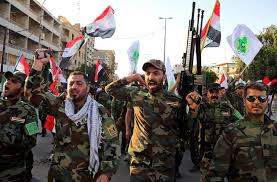March 1, 2016
As the Popular
Mobilization Force (PMF) was set aside from all ground assaults launched to
liberate Ramadi from the control of Daesh (the Arabic acronym of the
self-proclaimed Islamic State), and preventing the PMF’s participation in any
operations planned for Mosul, the issue of dissolving or merging the PMF into
the Ministry of Defense has gained more serious proportions. With 3 Americans
begin abducted in Baghdad, Washington began increasing its pressures on Iraqi
Prime Minister Haider al-Abadi to further limit the PMF and Shiite militias.
All efforts placed by the Iranian regime and senior PMF officials to maintain
this entity have remained futile. Tehran uses the PMF as a lever of pressure
against al-Abadi, yet the Iraqi PM, enjoying support from Washington, is
further pursuing the policy of restricting the PMF.
On February 6th
PMF deputy Abu Mahdi al-Muhandis had said, “Through its diplomats Washington
has announced to Baghdad there is no need for a popular volunteer force known
as the PMF, and their role must be brought to an end.” Al-Muhandis went on to
say that according to facts on the ground and information at their disposal,
the Iraqi government is taking steps aimed at restricting the PMF and to this
day many steps have been taken in this regard.
As the PMF were unable to
enter Tikrit, the Iranian regime and Quds Force chief Qassem Suleimani asked
al-Abadi to have coalition warplanes enter these clashes to open the path for
their forces to advance. The Iraqi government reached this conclusion the PMF
are not a reliable source for military assaults and these ground attacks must
be carried out by government military troops with the coalition.
In mid-December 2015
Revolutionary Guards chief Mohammad Ali Jafari in a gathering dubbed “Gaza:
Symbol of Resistance” in Tehran said there are measures being carried out in
Iraq and Syria to dissolve the PMF. However, in a meeting with Iraqi National
Security Advisor Falih Fayyad he has told him “dissolving the PMF and/or any
measures aimed at weakening these forces are a red line for the Islamic
Republic of Iran.”
In January U.S. forces
learned of the presence of PMF forces in the Ramadi front, entering the area
wearing federal police uniforms. The Americans stopped all operations and
demanded these forces to exit the area. They only re-launched their operations
after these forces had left the area.
At the beginning of 2016
around 80% of all PMF forces had not received their paychecks for 4 months. PMF
deputy Abu Mahdi al-Muhandis had ordered all PMF ranks and files their delayed
paychecks will not be paid and the government lacks any budget.
In this regard Fayyad is
pursuing the policy of Washington and limiting the PMF in their activities.
However, he is taking into consideration reservations regarding the Iranian
regime. Fayyad believes the PMF will not continue its activities as it is
today, and to refrain from dissolving the PMF he is seeking to merge the PMF
into a single unit in the Ministry of Defense, placing them under the
government’s hegemony. Fayyad travelled to Tehran in mid-January and referred
to the issues of divide between Iraq and the regime in saying: “The first issue
is the PMF and the future of this unit. The government believes the PMF must
not become a force in line with the army, and our Iranian friends want the PMF
to be in parallel and even more powerful than the Iraqi Army.” Fayyad has cited
U.S. Defense Secretary Ashton Carter saying the PMF are a temporary force and
after the war against ISIS they either be dissolved or merged into the ministries
of defense and interior.
With the criminal case of
Shiite militias and the PMF in Baghdad and Diyala provinces becoming active,
the social atmosphere against the PMF has become much more active, and the
revelations against the PMF’s crimes have made it difficult for the government
to have any contact with this force. A number of PMF commanders in Baghdad and
Diyala have been arrested and others are wanted by security forces for
sectarian killings and kidnappings.
PMF commuting is very
strictly controlled by Baghdad Operations Command, only allowed to move around
with written permission from the Baghdad Operations Command. The central
government has gathered all the PMF heavy weapons belonging. The Baghdad
Operations Command has placed regulations on holding heavy weapons in Baghdad
and the capital beltway, conditioning such arms on possessing special cards
from the prime ministry. The freedom of action for the PMF inside Baghdad in
using tinted-window and government vehicles, and having military convoys
entering or exiting Baghdad are now very limited and restricted.
Al-Abadi in his speech at
the Munich Security Conference described the PMF as a government entity, yet
added this entity has allowed armed groups to join that are out of the
government’s control, and the government will not allow arms to be out of its
control. The government intends to take on these groups and bring suspects
before courts.
Al-Abadi took action to
limit the PMF by decreasing their wages, cutting their numbers by 30% as a
result. This measure is in line of eliminating the PMF, whose numbers are
estimated at 30,000 to 40,000.
Last week al-Abadi
appointed Mohsen al-Ka’bi as PMF deputy in administrative, financial and
logistical affairs. The post held by Abu Mahdi al-Muhandis has been described
as PMF director of military operations. This post is truly rhetorical
considering the fact that the PMF is not involved in any military campaign.

No comments:
Post a Comment